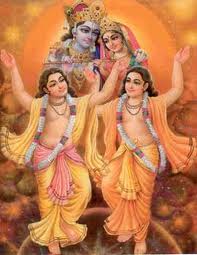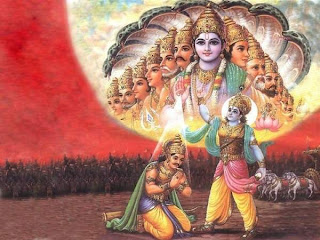GITA ON BHAKTI AND THOSE ENTITLED TO IT
God after sharing about those that are entitled to "bhakti" in Gita 9/33, He says -
"anityamsukham lok mimam praapya bhajasva maam."
In other words, "on attaining the human body that is perishable and void of pleasure, only become devoted to Me and remember Me alone." This body has been called impermanent and temporary, because one cannot rely on it. One does not know when it will be destroyed. Therefore God alerts us that you must realize Me, while the body remains. It has also been said in Bhagwat -
"Labdhvaa sudurlabhamidam bahusambhavaante Maanushyamadarthmanityamapeeh dheerah |
Toornam yatet na patedanumrutyu yaavannih shreyasaaya vishayah khalu sarvatah syaat || (Srimad Bhagwat 11/9/29)
On accomplishing many aims, at the end on many births, on attaining this very rare, but perishable human body, he should very quickly, as early as possible, endeavour towards self-realization before death arrives; because one can most certainly get sense objects anywhere, but one cannot realize God." In the eight chapter of Gita, God has called this world "dukhaalayamashaashvatam" (an abode of sorrow), then where is the happiness in it? Just as you cannot get medicines in a book shop (pustakaalay) and you cannot get clothes in a pharmacy (aushadhaalay), very much the same way, in the world that is filled with sorrow, one cannot get happiness. There is no happiness at all.
Until a man does not deeply yearn and long for something, till then, no object has the power to give him pleasure. Therefore, to gain pleasure from things, a deep yearning for those objects of pleasure and a feeling of lack (void without them) is absolutely essential and in experiencing that lack (void) there can be no sign of happiness, there is sorrow and only sorrow.
There are two men in the same situation that are going together, dressed similarly. Both do not have shoes or umbrella and both are wearing torn clothes. Both look alike. Of the two, one is a man without desires, unattached to worldly objects (virakt) with the world. One feels the lack of things. There is no sign of displeasure in the unattached person, whereas there is no sign of happiness, in the second person who feels deficiency. He remains agitated due to experiencing shortage of things. The temporary objects can only give momentary pleasure to him, not to the "virakt" (unattached to worldly objects). The reason is that even when there is complete absence of things, then too a "virakt" (detached from worldly objects) does not experience so. i.e. "virakt" person unattached to worldly objects does not feel the need for anything. In such a state, no objects have the power to give him pleasure. The gist is, on having no experience of anything lacking, an object does not have the ability to give one pleasures. Money cannot give pleasure to he who does not want money. A woman cannot give happiness to he who does not want a woman. Those who gain pleasures are the ones who have experienced a void of those things. From this it is proven that the objects give sorrow even in their absence. On acquiring them there is constant doubt of them departing. Not having them is troublesome, and on seeing those things amply with others, there is a sense of jealousy. Even when the thing is destroyed it only gives sorrow. Those who have experienced the death of their son, have share how the remembrance of him torments them. On separation from son, a man cries in remembrance, what to speak of that pain and suffering? Worldly happiness is also a source of pain.
(to be continued...)
From book "Jeevan ka Kartavya" in Hindi by Swami Ramsukhdasji
------------------------------
If in doubt regarding the translation, please read the original Hindi message by Swamiji.
FOR MESSAGE IN HINDI PLEASE VISIT Date : 16th December, 2011 – GITA MEIN BHAKTI AUR USKE ADHIKAARI
http://www.satcharcha.







